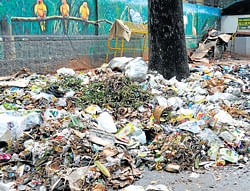
The City’s failure to adhere to the norm on garbage segregation at source may soon force the State government and BBMP to make it mandatory.
The Palike is keen on such a step and is in the process of verifying whether the Supreme Court’s recent remark on the subject is an observation or a directive. “It is learnt that the Supreme Court has spoken on the matter recently. Whether segregation at source is an observation or a directive is to be verified,” said Palike Commissioner Shankarlinge Gowda.
Palike sources said garbage segregation could reduce the burden on landfills by nearly 80 per cent. Currently, the landfills are overloaded by 3,000 to 4,000 tonnes of waste each day.
When questioned whether the Palike would penalise citizens who failed to segregate garbage, Gowda was ambiguous.
“Nowhere in the country have urban local bodies implemented such a penal clause. May be, we will be the first,” he said.
The garbage crisis, a result of allegations that Ramky and Terra Firma had been disposing of garbage improperly at their landfills, has led the Palike to consider mandatory action.
Gowda said the Palike was currently in talks with two not-for-profit organisations, City Connect and Round Table, to ensure that garbage was segregated at source.
“Our primary focus now is to contain the wet waste within the City, before transporting the rest to landfills,” Gowda said. New garbage tenders had specified that segregation would be mandatorily done by garbage contractors before the waste was sent to landfills, he said.
Legal precedent
There is already a legal precedent governing the separation of garbage types.
A 1998 committee under Asim Barman, the former commissioner of the Calcutta Municipal Corporation, had set guidelines for the proper disposal of garbage. Consequently, in an order on February 15, 2000, the Supreme Court had said, “We direct the statutory authorities through their respective heads to ensure proper and scientific disposal of waste in a manner so as to subserve the common good.
In this connection, they shall endeavour to comply with the suggestions and directions contained in the report prepared by the Asim Barman Committee.”
Clause 3.16 of the Asim Barman report directs that, “All organic and bio-degradable waste collected from households, shops, markets, hotels and other establishments shall first be composted by following suitable methods of composting with or without power generation. Only rejects and domestic hazardous waste shall be carefully landfilled.”
As per the report, all bio-medical waste is to be disposed of as per the bio-medical waste (management and handling) rules of 1998.